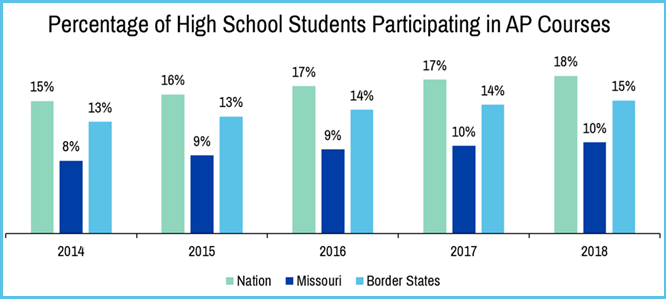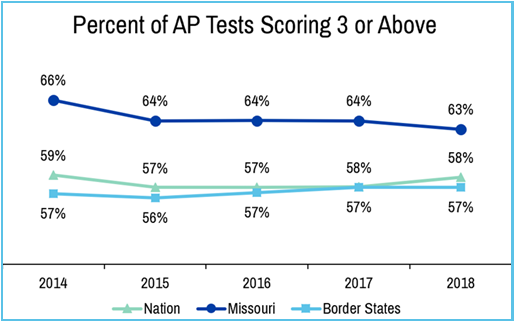Finishing High School in a Global Health Crisis
The Class of 2020’s Unique Graduation Experience
The month of May brings a sense of finality for the school year, but it’s often a mad dash to the finish. As states shifted to home and virtual learning for the spring of 2020, many accommodations had to be put in place for some major milestones in the academic careers of all students. This is especially true for high school students. Often, the month of May for high schoolers includes completing Advanced Placement (AP) exams and seniors graduating and moving on to the next chapter in their lives. Therefore, decisions regarding programs like AP testing and meeting graduation requirements are paramount during this abnormal spring semester
In this blog, we take a look at some of the major policy shifts and how major high school milestones look different in the midst of the COVID-19 pandemic.
AP Exams at home?
Every year, millions of high school students enroll in AP classes, which are college-level courses that culminate in an exam to potentially earn college credit. In total, there are 38 different AP courses available that cover topics including physics, literature, government, and art. Each course has an optional test administered by the College Board and scored on a 5-point scale, with scores of 3 or higher often earning college credit. In a typical year, students in AP courses sit for these paper-and-pencil exams during the school day in early Spring.
The 2020 AP testing window opened May 11 with a different look. In response to a survey of 18,000 AP students, the College Board developed online, open-response exams for students to complete. Tests will follow the same schedule as originally planned and are listed on the College Board’s website. Unlike previous years, the exams are open book and open note and are completed via a web portal from wherever the student opts to take the test. Concerns around cheating surfaced almost immediately when the testing window opened, leading the College Board to cancel registration for several students.
Author’s calculations
Missouri is following the guidance provided by the College Board for those students who enrolled in AP courses. Last year’s senior class in Missouri saw 21 percent of the roughly 66,000 graduates take at least one AP class during high school. Missouri’s overall AP participation has typically been on the low end compared to national trends, likely attracting those with a strong interest in attending college. Because of this, more of Missouri’s [1] [2] students earn college-credit eligible scores than the national average. participation in and completion of AP courses and tests are usually a component of the College and Career Readiness standard in Missouri’s School Accountability System. However, Missouri will not be producing accountability scores for the 2019-2020 school year, so it remains to be seen how this will affect exam participation and data reporting.
Author’s calculations
High School Graduation, check most of the boxes
For many students, high school graduation is the final hurdle to enrolling in post-secondary education and serves as a celebration of completing a major chapter in their lives. While schools and districts have gotten creative to celebrate the class of 2020, lead up to graduation has not been without (extra) drama.
Often, the Spring semester of senior year presents a last chance to complete any missing credit hours. This became more concerning once the state announced the cancellation of MAP testing and the suspension of in-person class meetings for the remainder of the school year. To graduate in Missouri, students must complete a minimum of 24 credits. Along with the minimum number of earned credits, the class of 2020 in Missouri had a few additional hurdles to clear: CPR and Heimlich Maneuver Training, successfully passing a test on the United States and Missouri Constitutions, and passing a 100-question civics exam similar to the test completed by applicants for United States Citizenship. This year’s class would have been the first to fulfill the civics requirement
However, the Department of Elementary and Secondary Education requested and received approval to waive these additional requirements for the class of 2020. DESE’s guidance regarding students who may be short on credits is for districts and schools to use the broad flexibility available to allow seniors to demonstrate competency and earn missing credits. However, decisions must be applied to all students, including decisions to allow Pass/Fail grading.
What’s it all mean?
What do all these decisions mean for Missouri’s high schoolers and the class of 2020? Generally, the state and education entities are doing as much as they can to be accommodating of this unprecedented situation, all with the goal of helping as many students as possible.
One thing that many will likely notice is that the data being collected and often used to inform decisions at the state and local level is going to be severely lacking for the 2019-2020 school year. While we at the PRiME Center enjoy diving into the data made available to evaluate policies like the Civics exam and AP participation, we will likely have to put an asterisk next to the information resulting from the COVID year. Moving forward, the question will be whether these accommodations were implemented equitably or if they only widened access and participation gaps. We’ll only be able to answer these questions with the information that is made available.
In the meantime, we would like to extend our heartfelt congratulations to the Class of 2020 and wish the best of luck to all those students navigating the online AP exams.








This week in neighboring Illinois, a bill to ban cell phones from classrooms unanimously passed in the Senate. The bill, advocated for by Illinois’ Governor J.B. Pritzker, now moves to the House. If passed, they would join the more than 40% of states who have laws or policies restricting cell phone use in schools. Missouri has similar legislation in the works, and voters are in support.